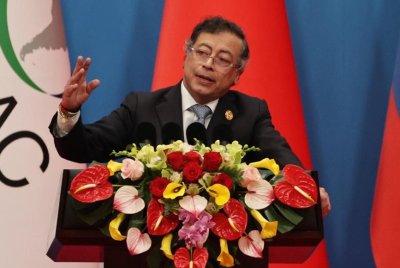
Colombian President Gustavo Petro intends to call a national referendum by executive decree to revive parts of his agenda — particularly a labor reform bill recently rejected by the Senate. Photo by Andres Martinez Casares/EPA-EFE
SANTIAGO, Chile, June 5 (UPI) — Colombia is at a democratic crossroads as President Gustavo Petro clashes with Congress and civil society over political disputes, legislative gridlock and stalled reforms.
At the center of the dispute is Petro’s announcement that he intends to call a national referendum by executive decree to revive parts of his agenda — particularly a labor reform bill recently rejected by the Senate.
For weeks, Petro’s proposal to call a national referendum has polarized the political climate.
His administration says the referendum would allow voters to weigh in on key issues, including healthcare and pension reforms, public debt restructuring and the potential formation of a constituent assembly.
The opposition and several legal experts have called the measure unconstitutional and an overreach of presidential powers.
Colombia’s Constitution outlines specific requirements for calling a national referendum, including congressional approval.
Petro’s opponents warn that bypassing this step would set a dangerous precedent, weakening democratic institutions and the separation of powers.
The possibility that Petro could issue a decree to call a national referendum without congressional approval may lead to a legal challenge before Colombia’s Constitutional Court. The court’s final ruling on the legality of such a decree will be critical in determining the future of the initiative and the balance of power among government institutions.
In addition to the referendum controversy, Petro’s labor reform proposal suffered a major defeat in the Senate, where it was rejected and shelved. The bill, one of the administration’s flagship initiatives to “dignify labor and improve working conditions,” failed to secure enough votes to move forward in the legislative process.
The government’s proposed labor reform included cutting the standard daytime work shift to eight hours, doubling pay for work on Sundays and holidays, formalizing employment for digital platform workers, extending paternity leave to 12 weeks and ensuring equal pay for men and women.
Business groups, such as the National Business Association of Colombia and the National Federation of Merchants have been outspoken in opposing the bill. They argue the reform would have negative economic consequences, including job losses, reduced investment and a rise in unregulated employment.
Despite the government’s efforts and intense debate, the bill failed to win over enough senators, many of whom also raised concerns about the reform’s potential impact on job creation and business competitiveness.
Attention now turns to the Constitutional Court, whose decision will be pivotal for the future of the referendum proposal and the broader institutional balance in Colombia.